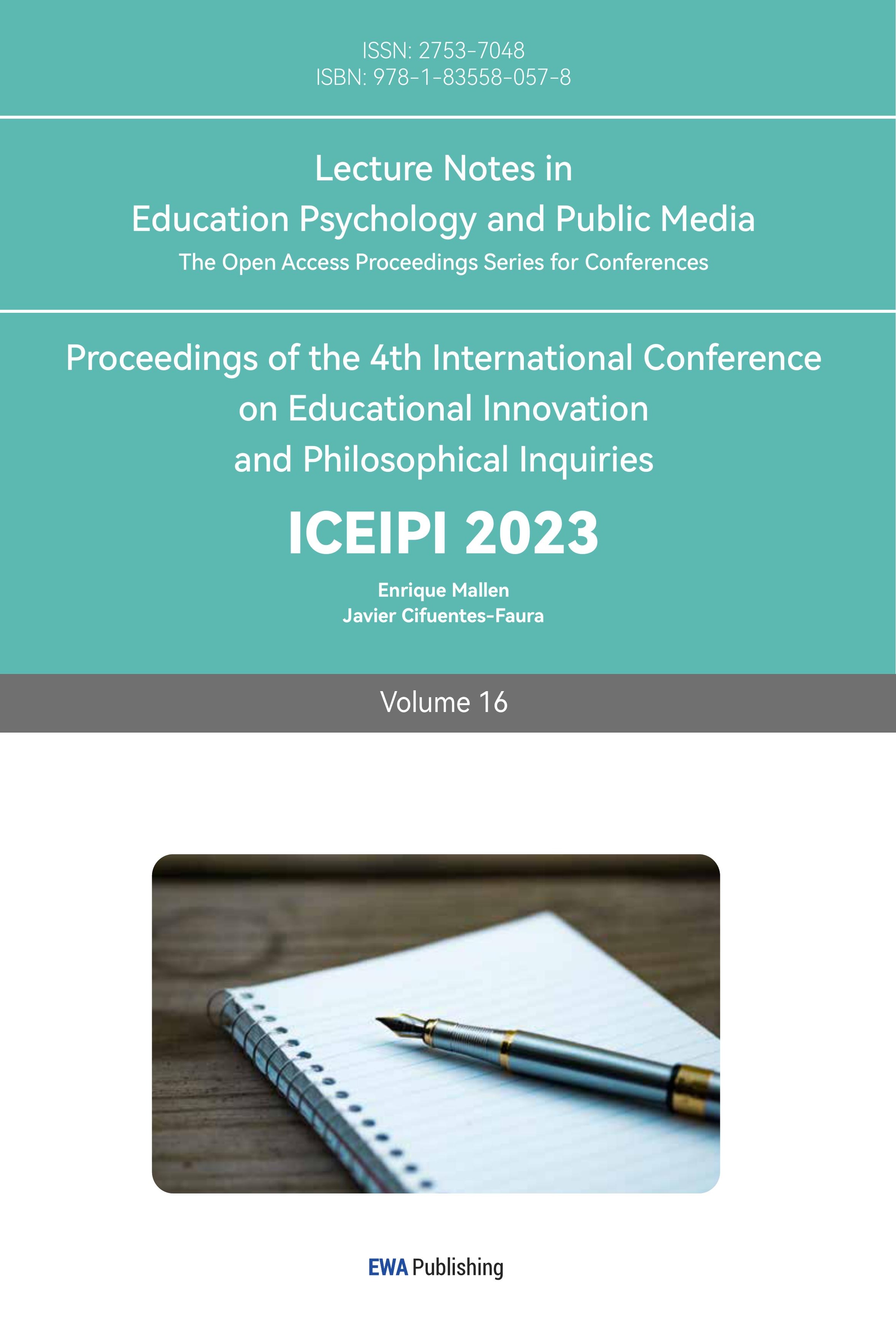References
[1]. Hagen, E.H. (2011). Evolutionary Theories of Depression: A Critical Review. Canadian Journal of Psychiatry, 56(12), 716–726.
[2]. Sekhar, Patwardhan, M., and Singh, R.K. (2013). A literature review on motivation. Global Business Perspectives, 1(4), 471–487.
[3]. Millgram, Y., Joormann, J., Huppert, J.D., Lampert, A., and Tamir, M. (2019). Motivations to Experience Happiness or Sadness in Depression: Temporal Stability and Implications for Coping With Stress. Clinical psychological science, 7(1), 143-161.
[4]. Ford, B.Q., Shallcross, A.J., Mauss, I.B., Floerke, V.A., and Gruber, J. (2014). Desperately Seeking Happiness: Valuing Happiness is Associated With Symptoms and Diagnosis of Depression. Journal of social and clinical psychology, 33(10), 890-905.
[5]. Arens, E.A., and Stangier, U. (2020). Sad as a Matter of Evidence: The Desire for Self-Verification Motivates the Pursuit of Sadness in Clinical Depression. Frontiers in psychology, 11, 238-238.
[6]. Meng, X., and Yang, D. (2022). Work motivation associated with depression: The role of job burnout and mental resilience. Current psychology (New Brunswick, N.J.).
[7]. Masselink, M., van Roekel, G.H., and Oldehinkel, A.J. (2018). Self-esteem in early adolescence as predictor of depressive symptoms in late adolescence and early adulthood: The mediating role of motivational and social factors. Journal of youth and adolescence, 47(5).
[8]. McGuirk, L., Kuppens, P., Kingston, R., and Bastian, B. (2018). Does a Culture of Happiness Increase Rumination Over Failure? Emotion (Washington, D.C.), 18(5), 755-764.
[9]. Grahek, I., Shenhav, A., Musslick, S., Krebs, R.M., and Koster, E.H.W. (2019). Motivation and cognitive control in depression. Neuroscience and biobehavioral reviews, 102, 371-381.
[10]. Messerotti Benvenuti, S., Buodo, G., Mennella, R., Dal Bò, E., and Palomba, D. (2019). Appetitive and aversive motivation in depression: The temporal dynamics of task-elicited asymmetries in alpha oscillations. Scientific Reports, 9(1), 17129-17111.
Cite this article
Deng,Y. (2023). The Impact of Motivation to Experience Happiness on Depressive Symptoms. Lecture Notes in Education Psychology and Public Media,16,297-304.
Data availability
The datasets used and/or analyzed during the current study will be available from the authors upon reasonable request.
Disclaimer/Publisher's Note
The statements, opinions and data contained in all publications are solely those of the individual author(s) and contributor(s) and not of EWA Publishing and/or the editor(s). EWA Publishing and/or the editor(s) disclaim responsibility for any injury to people or property resulting from any ideas, methods, instructions or products referred to in the content.
About volume
Volume title: Proceedings of the 4th International Conference on Educational Innovation and Philosophical Inquiries
© 2024 by the author(s). Licensee EWA Publishing, Oxford, UK. This article is an open access article distributed under the terms and
conditions of the Creative Commons Attribution (CC BY) license. Authors who
publish this series agree to the following terms:
1. Authors retain copyright and grant the series right of first publication with the work simultaneously licensed under a Creative Commons
Attribution License that allows others to share the work with an acknowledgment of the work's authorship and initial publication in this
series.
2. Authors are able to enter into separate, additional contractual arrangements for the non-exclusive distribution of the series's published
version of the work (e.g., post it to an institutional repository or publish it in a book), with an acknowledgment of its initial
publication in this series.
3. Authors are permitted and encouraged to post their work online (e.g., in institutional repositories or on their website) prior to and
during the submission process, as it can lead to productive exchanges, as well as earlier and greater citation of published work (See
Open access policy for details).
References
[1]. Hagen, E.H. (2011). Evolutionary Theories of Depression: A Critical Review. Canadian Journal of Psychiatry, 56(12), 716–726.
[2]. Sekhar, Patwardhan, M., and Singh, R.K. (2013). A literature review on motivation. Global Business Perspectives, 1(4), 471–487.
[3]. Millgram, Y., Joormann, J., Huppert, J.D., Lampert, A., and Tamir, M. (2019). Motivations to Experience Happiness or Sadness in Depression: Temporal Stability and Implications for Coping With Stress. Clinical psychological science, 7(1), 143-161.
[4]. Ford, B.Q., Shallcross, A.J., Mauss, I.B., Floerke, V.A., and Gruber, J. (2014). Desperately Seeking Happiness: Valuing Happiness is Associated With Symptoms and Diagnosis of Depression. Journal of social and clinical psychology, 33(10), 890-905.
[5]. Arens, E.A., and Stangier, U. (2020). Sad as a Matter of Evidence: The Desire for Self-Verification Motivates the Pursuit of Sadness in Clinical Depression. Frontiers in psychology, 11, 238-238.
[6]. Meng, X., and Yang, D. (2022). Work motivation associated with depression: The role of job burnout and mental resilience. Current psychology (New Brunswick, N.J.).
[7]. Masselink, M., van Roekel, G.H., and Oldehinkel, A.J. (2018). Self-esteem in early adolescence as predictor of depressive symptoms in late adolescence and early adulthood: The mediating role of motivational and social factors. Journal of youth and adolescence, 47(5).
[8]. McGuirk, L., Kuppens, P., Kingston, R., and Bastian, B. (2018). Does a Culture of Happiness Increase Rumination Over Failure? Emotion (Washington, D.C.), 18(5), 755-764.
[9]. Grahek, I., Shenhav, A., Musslick, S., Krebs, R.M., and Koster, E.H.W. (2019). Motivation and cognitive control in depression. Neuroscience and biobehavioral reviews, 102, 371-381.
[10]. Messerotti Benvenuti, S., Buodo, G., Mennella, R., Dal Bò, E., and Palomba, D. (2019). Appetitive and aversive motivation in depression: The temporal dynamics of task-elicited asymmetries in alpha oscillations. Scientific Reports, 9(1), 17129-17111.









